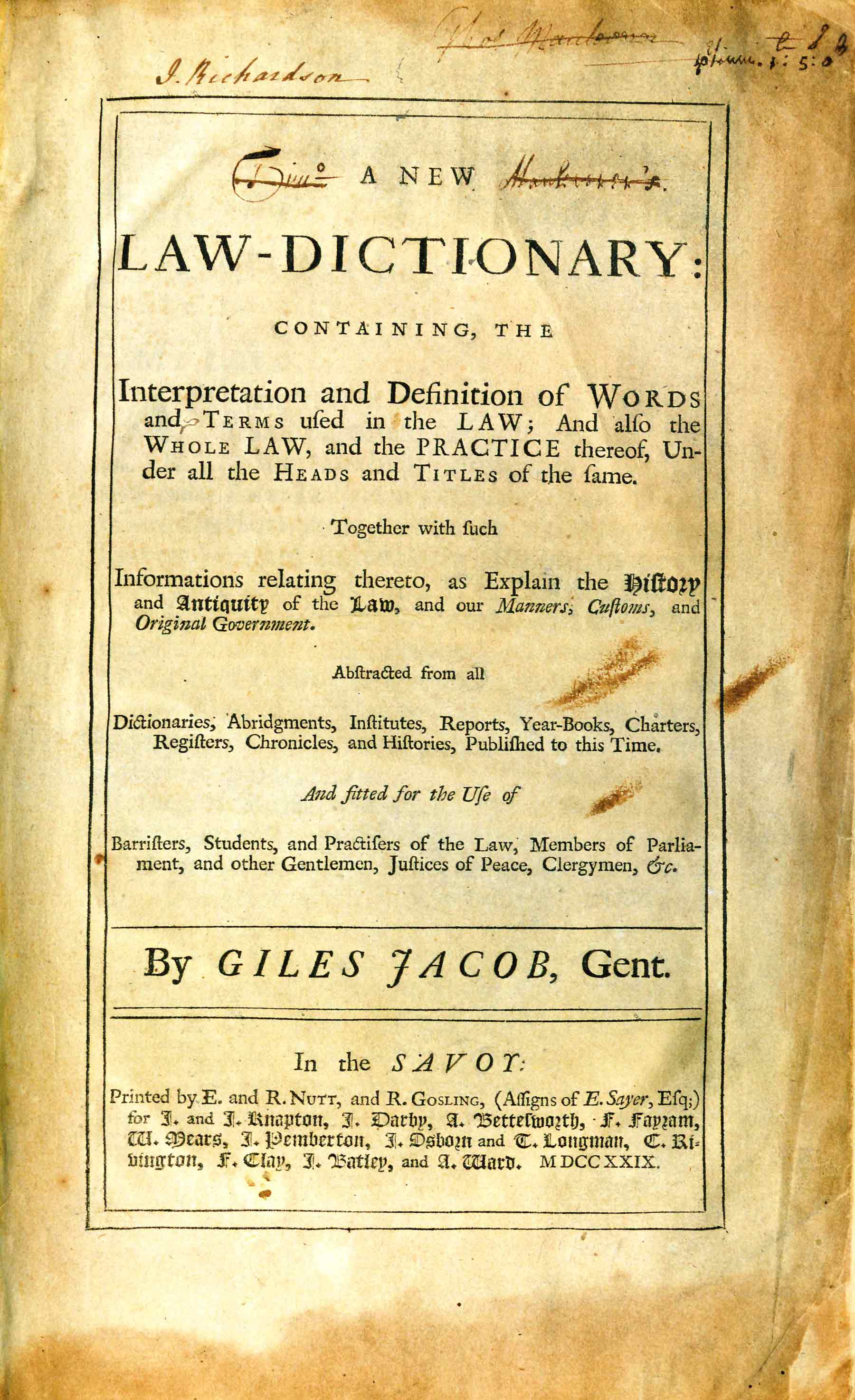A New Law-Dictionary: Containing, the Interpretation and Definition of Words and Terms Used in the Law, and also the Whole Law, and the Practice Thereof, under All the Heads and Titles of the Same
by Giles Jacob
| A New Law-Dictionary | |
|
Title page from A New Law-Dictionary, George Wythe Collection, Wolf Law Library, College of William & Mary. | |
| Author | Giles Jacob |
| Published | [London] In the Savoy: Printed by E. and R. Nutt, and R. Gosling, (assigns of E. Sayer, Esq.) for J. and J. Knapton et al. |
| Date | 1729 |
| Edition | First |
| Language | English |
| Pages | [4], 4, [764] |
| Desc. | Folio (34 cm.) |
| Location | Shelf K-5 |
A New Law Dictionary is the most famous work of Giles Jacob (1686 – 1744), a British legal writer and literary critic. A prominent compiler of law in the early eighteenth century, Jacob published several influential texts on local courts and officers; conveyances; and constitutional, military, commercial and criminal law; and political and poetical work.[1] Jacob was heavily influenced by philosophers John Locke and Thomas Hobbes, both of whom believed that "a general agreement on the definition of words was necessary" to eliminate confusion about the meaning of law and the legal rights of people.[2]
Published in 1729 by E. and R. Nutt and R. Gosling, A New Law Dictionary has elements of both a dictionary and an abridgment of law.[3] In addition to a compilation of legal definitions and a list of Anglo-Saxon and French vocabulary, the treatise includes writs, judicial opinions, legal forms, and other materials that Giles believed would help others better understand the meaning of the law in clear, simple terms.[4] Giles’ dictionary went through ten editions before 1800.[5] In both Britain and colonial America, Giles’ Law Dictionary was one of the most widely read English legal dictionaries and often found in the libraries of distinguished colonial lawyers and jurists.[6]
Evidence for Inclusion in Wythe's Library
Listed in the Jefferson Inventory of Wythe's Library as "Jacob's L. D. fol." and given by Thomas Jefferson to Dabney Carr. The Brown Bibliography[7] includes the first edition (1729) while George Wythe's Library[8] on LibraryThing indicates "Precise edition unknown. Numerous folio editions were published, beginning in 1729." The Wolf Law Library followed Brown's suggestion and purchased a copy of the first edition.
Description of the Wolf Law Library's copy
Bound in recent period-style quarter calf over marble boards, raised bands, with blind ornaments and lettering piece on the spine. The title page includes signatures of previous owners. Purchased from The Lawbook Exchange, Ltd.
Images of the library's copy of this book are available on Flickr. View the record for this book in William & Mary's online catalog.
Full text
- A New Law-Dictionary (99MB PDF)
See also
- George Wythe Room
- Jefferson Inventory
- A Treatise of Laws or, A General Introduction to the Common, Civil, and Canon Law
- Wythe's Library
References
- ↑ Julia Rudolph, "That 'Blunderbuss' of Law: Giles Jacob, Abridgment, and Print Culture," Studies in Eighteenth Century Culture 37 (2008): 197-215. Abstract accessed October 10, 2013, on Project Muse.
- ↑ Law Dictionary Collection, s.v. "Giles Jacob: 1686-1744," The University of Texas School of Law, accessed October 10, 2013.
- ↑ Ibid.
- ↑ Ibid.
- ↑ Ibid.
- ↑ Rudolph, “That ‘Blunderbuss’ of Law."
- ↑ Bennie Brown, "The Library of George Wythe of Williamsburg and Richmond," (unpublished manuscript, May, 2012) Microsoft Word file. Earlier edition available at: https://digitalarchive.wm.edu/handle/10288/13433.
- ↑ LibraryThing, s.v. "Member: George Wythe," accessed on September 16, 2013.
External Links
Read this book in Google Books.
